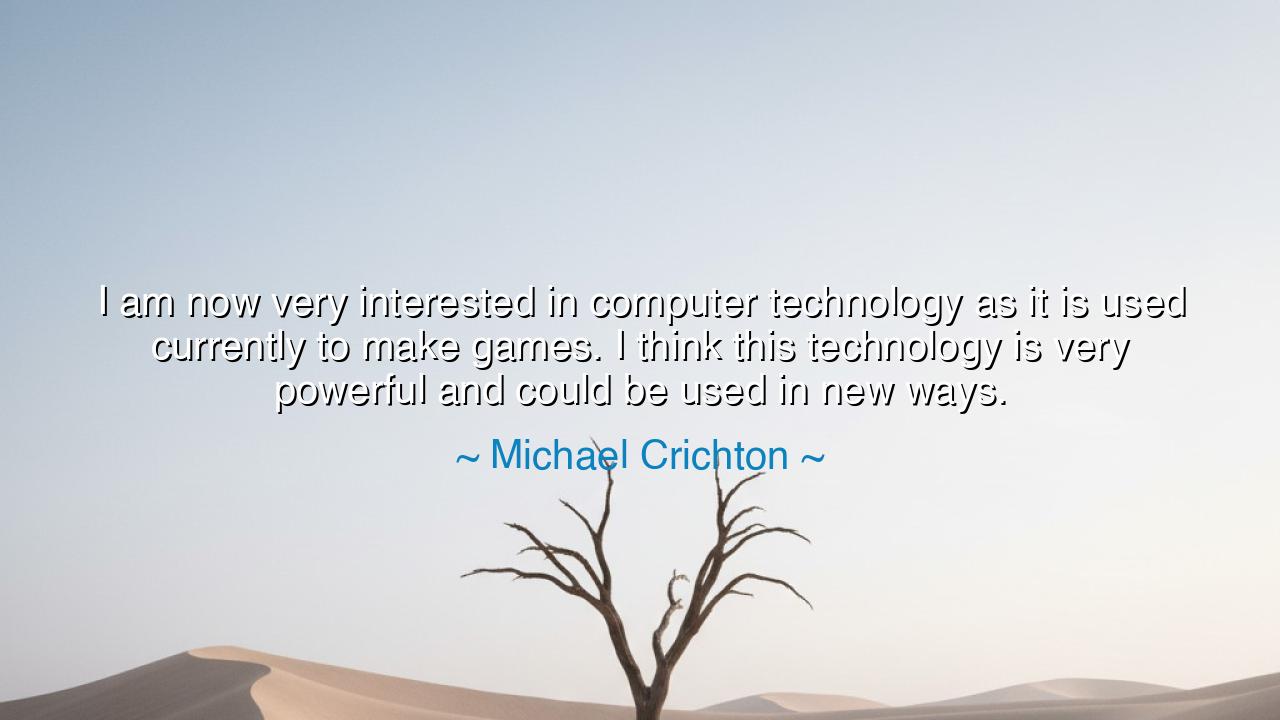
I am now very interested in computer technology as it is used
I am now very interested in computer technology as it is used currently to make games. I think this technology is very powerful and could be used in new ways.






In the words of Michael Crichton, physician, storyteller, and seer of futures, there is spoken a truth both simple and profound: “I am now very interested in computer technology as it is used currently to make games. I think this technology is very powerful and could be used in new ways.” This statement, though born from his fascination with digital tools, is not merely about games. It is about the hidden strength of new inventions, about seeing beyond their immediate purpose, and about the endless potential of human creativity when it wields the instruments of its own making.
For what are games, if not the playgrounds of imagination? To the casual observer, they are diversions, amusements for leisure. Yet Crichton saw deeper. He saw that the technology crafted for play could, in other hands, be transformed into tools for medicine, for education, for simulation, for the very shaping of society itself. This is the ancient lesson of invention: the bow, first made for hunting, becomes the weapon of kings; the plough, first made for survival, becomes the cornerstone of civilization. So too with game technology—it is not confined to play, but is a seed for greater purposes.
Consider the tale of the flight simulator, born from the merging of game-like graphics and physics. What began as entertainment in digital laboratories became, in time, the training ground for pilots across the world, saving countless lives by allowing them to rehearse in safety. In the same way, Crichton foresaw that powerful computer technology could leap from the realm of gaming into the realm of knowledge, industry, and discovery. He was a prophet of adaptability, urging mankind to look past appearances and grasp the hidden power within.
Crichton himself was no stranger to this pattern. In his novels like Jurassic Park, he imagined worlds where science and entertainment collided, where simulations and experiments revealed truths about human ambition and hubris. His fascination with technology was never about the machine alone, but about its capacity to reshape how we live, how we think, and how we dream. When he spoke of game technology as "powerful," he was speaking as a man who knew that the tools of play might one day change the destiny of nations.
The meaning of his words, then, is this: do not dismiss the tools of the present as trivial, for in them lies the blueprint of tomorrow. What seems like a toy may become a teacher. What seems like a diversion may become a discipline. Crichton’s insight reminds us that invention is always greater than its first use, and the wise will always search for ways to expand its purpose.
The lesson for us is clear: look at the technologies around you—not only with the eyes of consumption, but with the eyes of creation. Ask yourself, How else can this be used? What greater need could this serve? For the tools in our hands—whether in games, in art, or in science—carry potential far beyond their surface. Creativity lies not only in making something new, but in finding new purposes for what already exists.
So let Michael Crichton’s words be remembered as both a vision and a charge: do not dismiss the power of play, nor underestimate the technology of games. For in their engines, in their codes, in their simulations, lies the seed of tomorrow’s breakthroughs. To the dreamers and the builders, the challenge is set: take what entertains, and transform it into what enlightens; take what amuses, and reshape it into what empowers. This is the way forward—the way of those who see beyond the surface into the vast horizons of possibility.






AAdministratorAdministrator
Welcome, honored guests. Please leave a comment, we will respond soon